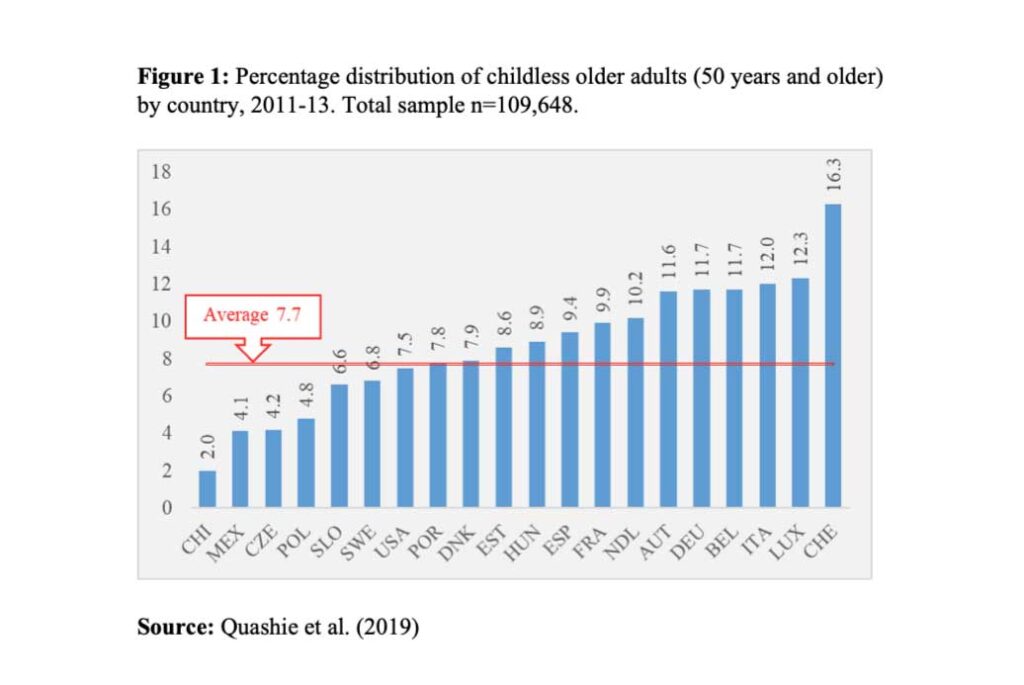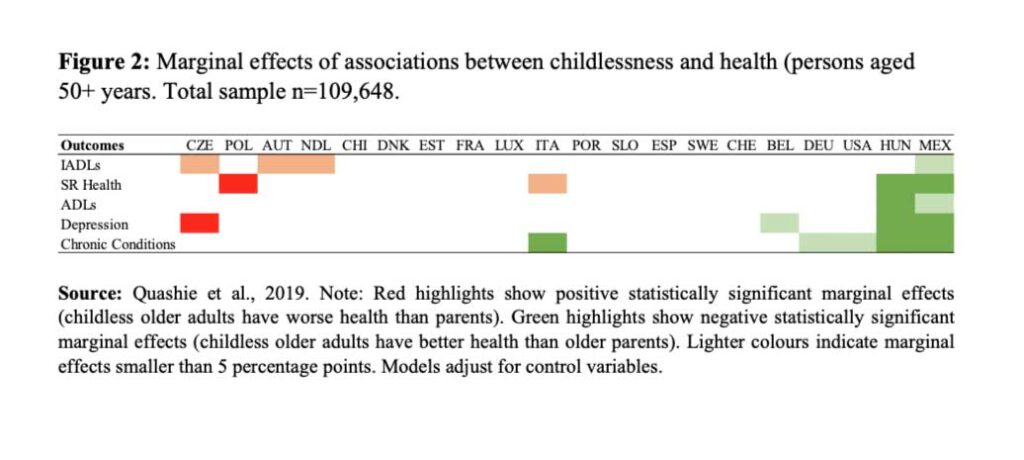As children are often the main source of support in later life, childless older adults are presumed to have higher risks of poor health compared to parents. Nekehia T. Quashie, Bruno Arpino, Radoslaw Antczak, and Christine A. Mair show that this is not always the case: the health of childless older adults varies by country of residence and health measure considered.
Background
Children are the primary source of support for a majority of aging individuals across the globe. Thus, childless older adults are often assumed to have higher risks of poor health compared to parents due to lower social support, weakened sense of meaning, and greater social isolation (Hansen 2012). Children may, however, also be a source of social and/or economic strain at earlier life stages (Umberson, Pudrovska, & Reczek, 2010), which may contribute to health vulnerability at older ages. Research also shows that the health of older adults, with or without children, depends on the health dimension examined (Keenan & Grundy, 2019).
The health gap between parents and non-parents in later life depends also on several contextual factors including cultural norms about the meaning of family and children in the lives of older adults, the availability of public support for them, and income inequality, which shapes older adults’ access to quality health care (Albertini & Mencarini, 2014; Dickman, Himmelstein, & Woolhandler, 2017; Hansen, 2012).
However, prior cross-national research on the health of older adults with and without children has focused on comparisons within one global region or on small samples of countries from different global regions; it has examined associations for one or few health outcomes, and has applied different conceptualizations of childlessness. This makes it difficult to determine whether childless older adults are indeed at risk of poorer health than parents across different social contexts.
In a recent study, using harmonized cross-sectional data from the Health Retirement Study (HRS) global family of aging surveys provided by the Gateway to Global Aging repository (Lee, 2015), we examined the association between childlessness and health among adults aged 50 years and older (Quashie et al., 2019). We used data for comparable years (2011-2013) from four global regions: Europe (SHARE), North America (HRS), Latin America and the Caribbean (Mexico, MHAS), and Asia (China, CHARLS), 20 countries overall. In our study, older adults with no living children at the time of the survey were compared with older parents with one or more living children including biological, step or adopted children.
We adopted a multidimensional approach to health by examining physical, functional, and mental health:
- self-rated health (poor versus good),
- difficulties with activities of daily living (ADL, at least one among bathing, dressing and eating),
- difficulties with instrumental activities of daily living (IADL, at least one among managing money, taking medications, shopping, preparing meals),
- doctor diagnosed chronic conditions (at least one among high blood pressure, diabetes, cancer, stroke, lung disease, and heart disease), and
- depression (self-reported feelings of depression in the week prior to the interview).
For each health outcome, responses were coded to indicate poor, as opposed to good, health.
To compare the strength of the association between childlessness and health across countries, we computed the average marginal effect of childlessness, which can be interpreted as the percentage point difference between childless older adults and parents in the probability of experiencing a given “bad” health outcome.
Cross-national variation in childless older adults.
The prevalence of childlessness among older adults varies widely across the 20 countries in our study (Figure 1). China shows the lowest percentage of childless older adults (2%) followed by Mexico (4.1%). Within Europe, prevalence also varies widely, with the lowest in Czechia (4.4%) and Poland (4.8%), and the highest in Switzerland (16.3%). In other European countries, the prevalence ranges between 6% and 12%.

Are childless older adults at higher risk of poor health than parents?
Overall, childlessness was not significantly associated with older adults’ health, and this is probably our most important conclusion. When significant associations were observed, net of controls, there was no consistent relationship between childlessness and poor health across countries and health outcomes (Figure 2). In four countries (Czechia, Poland, Austria and the Netherlands), childlessness was associated with worse health for one or more outcomes. In five countries, (Mexico, Hungary, United States, Germany, and Belgium), childlessness was associated with better health. Childless older adults in Hungary and Mexico reported better health than parents across all indicators (except IADL in Hungary).

We found marked regional variations within Europe. For instance, Italy was the only Southern European country where childlessness was associated with health, but in an ambiguous way, as childless older adults are more likely to report poor overall self-rated health but less likely to report having a chronic condition. Among Eastern European countries, Hungary was the only country where childlessness was associated with health advantages; the opposite was found in Poland and Czechia.
Finally, childless older adults’ risk of poor health varies across health outcomes. Childlessness was associated with lower risk of chronic conditions in some countries (Italy, Germany, United States, Hungary and Mexico) but higher risk of having difficulty with at least one IADL in a few countries (Czechia, Austria, the Netherlands). In several countries, mixed patterns emerged for self-rated health, depression, and difficulty with at least one ADL.
Implications
Declining fertility and increasing life expectancy across the globe suggest that many people will age without children, one of the most traditional sources of support in later life, which may lead to health vulnerabilities. Our results, however, suggest that childless older adults are not an overall “at risk” segment of the older adult population in an international perspective: in some contexts, they even enjoy better health. Current and future social policies to protect the health of older adults should pay closer attention to individuals’ family resources. In some countries (e.g. Mexico and Hungary), social policies should also focus on protecting the health of older parents. In others (e.g. Czechia), policies need to address the multidimensional health vulnerability (e.g. mental and functional health) of childless older adults.
References
Albertini, M., & Mencarini, L. (2014). Childlessness and support networks in later life: New pressures on familistic welfare states? Journal of Family Issues, 35, 331–357. doi:10.1177/0192513X12462537
Dickman, S. L., Himmelstein, D. U., & Woolhandler, S. (2017). Inequality and the health-care system in the USA. Lancet (London, England), 389, 1431–1441. doi:10.1016/S0140-6736(17)30398-7
Hansen, T. 2012. Parenthood and happiness: A review of folk theories versus empirical evidence. Social Indicators Research, 108, 29–64. doi:10.1007/s11205-011-9865-y
Keenan, K., & Grundy, E. (2019). Fertility history and physical and mental health changes in European older adults. European Journal of Population, 35, 459–485. doi:10.1007/s10680-018-9489-x
Lee, J. 2015. Study descriptions: Health and retirement studies around the World. University of Southern California.
Quashie, N. T., Arpino, B., Antczak, R., & Mair, C. A. (2019). Childlessness and Health Among Older Adults: Variation Across Five Outcomes and 20 Countries. The Journals of Gerontology: Series B. doi: 10.1093/geronb/gbz153
Umberson, D., Pudrovska, T., & Reczek, C. (2010). Parenthood, childlessness, and well-being: A life course perspective. Journal of Marriage and the Family, 72, 612–629. doi:10.1111/j.1741-3737.2010.00721.x


